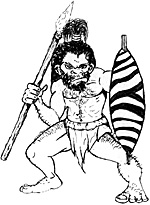 You might say that this eager savage is using the original "Weapon, MI." It normally is
locally procurable, and requires very little preventive maintenance. Also, it is highly effective at short range. It has won at least one Congressional Medal of Honour. Even today, the
energetic application of such a dornick can make a close-combat specialist quite a gentle person. Possibly we should begin stockpiling them for World War IV.
You might say that this eager savage is using the original "Weapon, MI." It normally is
locally procurable, and requires very little preventive maintenance. Also, it is highly effective at short range. It has won at least one Congressional Medal of Honour. Even today, the
energetic application of such a dornick can make a close-combat specialist quite a gentle person. Possibly we should begin stockpiling them for World War IV.
The hairy-chested fighting men of those primitive days left us no written account of their thoughts concerning the art of war. They simply told the story of their exploits to their companions and their children - what we now call "Oral History." Such tales were told and retold. A few of them like the Iliad - might survive to be finally written down as epic poems.
Now Oral History has one governing characteristic: the first time - possibly the second - that anyone tells the story of a particular experience, he probably will stick to the general facts. Thereafter, he begins to - as Shakespeare put it - "remember with advantages what feats he did that day."
So we may be certain that every time our hairy friend here retold the story of this particular fracas that rock got bigger, and bigger, and bigger - and that he threw it farther, and farther, and still farther!
Nevertheless, Oral History remains a major factor in the preparation of written military history. The oral after- action reports of scouts, patrols, platoon leaders, and pilots are basic building blocks. But you must get them as soon as possible, while the individuals involved are still scared and tired, and clear up any dubious points on the spot.
As the centuries passed, man domesticated the horse, organised himself into large social groupings, learned how to smelt metals, and invented the wheel. Warfare therefore became more civilised.
About this same time the human race also developed various written languages which enabled it to record its experiences for future study. The first well-authenticated books on the art of war appeared in China around 500 B.C. - but these books refer to earlier authorities on the same subject.
Well, What is the purpose of military history?
First, whether we are civilians or members of the Armed Forces, we should know something about the military aspect of our national history, if only as a matter of self respect. Neither Americans nor English are a militaristic people, but we are warlike nations. Otherwise neither of us would exist today. We are nations created, built and shaped by wars - an average of one every 20 years.
For members of our Armed Forces the basic reason runs far deeper. The military profession must operate under a unique handicap. We cannot practice it in peacetime. Our most realistic maneuvers, war games, and command post exercises cannot duplicate what really happens after the first shot is "fired in anger." Such exercises may test our intelligence, our professional knowledge, and our ability to remain alert without sleep -but they still do not tell us how we personally shall meet the real thing. When we must "lead" instead of "manage," and when a Ph.D. means far less than the ability to read a map - when the kissing has to stop, and the killing starts.
A fair parallel to that problem would be to imagine that a surgeon - say a surgeon specialising in heart surgery - would be compelled to practice half his lifetime on comparatively crude dummies. Then, suddenly, he would be confronted with his first human patient. He would be told flatly that the operation would be incredibly complicated and dangerous - and that any mistake on his part would mean his own death. Were this the case, there might very well be a shortage of surgeons.
Consequently, we are compelled to put considerable reliance on an analytical interpretation of the past to discover how other men met the dangers and challenges we may have to face. Weapons change, but the stone axe could kill you just as dead as any weapon in tomorrow's arsenal. Tactics change as the weapons change, but the basic principles of the art of war remain. "Surprise" once was an unexpected shower of coconuts from a tree top; today, it may be swarm of thermonuclear weapons sent whisking halfway around the world at the pressure of a button. In both cases, it merely proves the irreverent adage: "Twice-armed is he who hath a cause that's just. - And thrice-armed he who gets his blow in first."
In the same way, "mass" remains a principle of war, whether you measure it in files of sweaty pikemen or in megatons. "Mobility" is always the same, whether it means speeds approaching that of light - or the ability to move a mile further than your enemy can in one day's jungle crawling.
Frederick the Great put the basic reason for the study of military history very well and simply: "What is the good of experience if you do not reflect?" Frederick had plenty of experience of his own for educational purposes, but he was happy to learn from other people's experience - especially when it was the painful variety. Here, we might remind ourselves that there were plenty of "world wars" before the nineteenth century appropriated that title. Frederick's successful attempt to seize the province of Silesia from his Austrian neighbour brought on two wars - the War of the Austrian Succession and the Seven Years' War which raged all around the world. There was bloody battling in India, the East Indies, and along the west coast of Africa; scalps were lifted and armies marched and countermarched in New York; there was raiding and counter-raiding in and out of Alabama; the British took Manila and Canada; and central Europe was wracked from one end to the other. These wars may have been waged with sailing vessels and the original, hayeating form of horsepower, but their fleets and armies did a very good job of getting all around the world, and achieving a decision when they got there.
The military profession has another unique characteristic. We may be called to practice it almost anywhere in this world, under almost any conceivable assortment of conditions. We are expected to turn our hands to almost any sort of a job. More than that, we are expected to do well at all of them. Every day is apt to bring its own little surprise. Because of the sad fact that there are only 24 hours in any one day, we cannot expect to be thoroughly trained in advance for every assignment we may receive. But here again we can learn from other men's experience. As J.F.C. Fuller, the British historian points out, "...history should be looked upon as a laboratory in which experiments are unceasingly being made and are constantly being repeated ... unless the soldier knows what has been attempted in the past, and what reactions have followed, each attempt or suggestion he may make is likely to be a pure groping in the dark. "
Some unknown cynic gave this fact an extrasharp point: "History always teaches the same lessons - but their price keeps going up!"
Given similar conditions of combat, old weapons, old techniques, and old tactics have a way of becoming suddenly useful once again. What we may consider an entirely new concept in warfare, possibly one which must be learned hastily and at high cost, is too frequently an ancient military truism - which we thought out-of-date and so carelessly forgot.
As one small example, the wars of the seventeenth and eighteenth centuries were marked by frequent sieges. This was a form of trench warfare; consequently, the hand grenade appeared. Subsequently, the faster-moving, long- range Napoleonic campaigns made it obsolete, and it disappeared from the ordnance lists. Then came World War I and World War II, and the hand grenade had to be developed all over again.
Discipline
Military history as an exact discipline is of comparatively recent origin. Of course, for generations, most military men had seen the importance of studying earlier wars. But not as many of them saw the importance of reporting their own experiences as accurately as possible. Napoleon held that every aspiring young general should "Read over and over again the campaigns of Alexander, Hannibal, Caesar, Gustavus, Turenne, Eugene, and Frederick. Make them your models. This is the only way to become a great general and to master the secrets of the art of war."
But Napoleon himself was guilty of rewriting the reports of some of his own battles to make it seem that everything had gone exactly according to plan. With one brief exception during the 18th century - an almost forgotten Welsh soldier of fortune named Henry Lloyd - the custom of comparing and analysing the reports of both sides did not become well established until late in the 19th century. This is the method employed by our official military historians today and by our best civilian historians. As a quick example of how this should work, take the battle of Bunker's Hill in 1775:
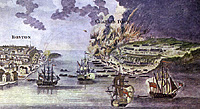 Large Bunker Hill Painting (slow: 120K)
Large Bunker Hill Painting (slow: 120K)
The amateur American army sent a detachment out onto the Charlestown peninsula to fortify Bunker's Hill, here at the peninsula's base. By some still-unexplained SNAFU, this detachment ended up digging in on Breed's Hill - literally "in the lion's mouth." The British reacted by landing here at the tip of the peninsula and - finally, after heavy losses defeating the Americans by a series of frontal attacks.
These tactics have been much derided by various American writers - why didn't those stupid Redcoats land here, on the south side of the neck of the peninsula - or, better yet, sail up the Mystic River and seize the neck of the peninsula, thus neatly bagging those impudent Yankees? A few of these American historians were men of some conscience: they studied the British reports and correspondence, but found no particular enlightenment therein, because they had only the vaguest knowledge of either 18th century British tactics or amphibious operations. Also they never thought to study the logs of the British Warships in Boston Harbour.
The British field commander, General Sir William Howe, knew his business. The British fleet at Boston, which would have to land his men on the peninsula was short of sailors and small boats and therefore could "lift' only half his force at a time. Accordingly he wanted a landing place where his first wave could be secure until the second wave reinforced it. That was here at the end of the peninsula, well away from the American positions and in open fields where British drill, discipline, and firepower should be able to beat off any American attack till help came.
But why not sail up the Mystic River? Well, the Mystic wasn't much of a river, and the British hadn't bothered to "sound" it to locate its shoals and channels. But there was one even more overriding consideration -- these were sailing vessels -- and the wind was blowing from the west! Moral: when you use enemy sources, get all the important ones.
Today, military history is not only respectable it's downright popular. Unfortunately, this recalls that Biblical admonition that is a good idea to beware when all men speak well of you. Right now military history is in the middle of what may well be the biggest and longest amateur hour on record. The shops and libraries are full of books on military history - and approximately half of them represent nothing much more than a waste of good paper. A good many of the responsible authors may have good intentions, but lack experience and background knowledge in military matters. Some, like the strange things which manage our American Public Broadcasting Service - PBS simply don't give a hoot, and will tell any sort of yarn if it is "politically correct." Others are scissors and paste operators or pot boilers who are simply out for a quick buck - and damn the consequences! (Our own specialty - Napoleonic history is cursed by hungry writers who have found that Americans probably will buy any literary abortion that has "Napoleon" in its title and includes a tour of Pauline Bonaparte's bedroom.) We also are beginning to be dosed with "Black History" and "Native American History," most of which is highly imaginative nonsense.
Possibly our greatest problem though is that every nation's military history is the literal core of that country's national pride and sense of national identity. Even the most scrupulous historians of different nations can see the same event quite differently. Take the battle of Waterloo: read accounts of it by popular British, Belgian, French, Dutch and German authors. When you get through you may very well wonder if you haven't studied five different battles, which somehow just happened to be fought at the same place at about the same time.
"myths, errors, and plain damn lies"
The vast bulk of military history therefore is full of myths, errors, and plain damn lies. As historians, we have a double responsibility - to help clean up this mess and avoid making it any worse.
One difficulty in that chore is that many of these tall tales, fables, and myths embody inspiring examples of courage and devotion, and have become treasured national traditions.
Waterloo
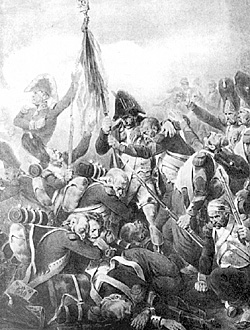 The Last Stand of the Guard depicting General Cambronne clinging to the standard (centre).
The Last Stand of the Guard depicting General Cambronne clinging to the standard (centre).
There's that especially famous one, from the battle of Waterloo. All of you have heard the story in one form or another - the last square of Napoleon's Old Guard stands like a rock, covering the retreat of the defeated French Army. An English officer, admiring their courage, calls on them to surrender. Whereupon General Cambronne, commanding the square, replies, "The Old Guard dies, but never surrenders."
As a matter of fact, Cambronne wasn't in any "last square." He had been wounded and captured when his own battalion was overwhelmed in covering the beginning of the retreat. He had been summoned to surrender, but his reply -- if he actually said anything at all -- seems to have been more explicit than elegant. Translated into polite English, it was approximately, "I defecate on you!"
Finally, there wasn't any "Last square at Waterloo. The senior units of the Old Guard came off the field in splendid order, handing out lumps & bumps to any English or Prussians uncouth enough to hustle them!
Cambronne himself, by the way, was the first victim of this myth, which seems to have been concocted by a Paris newspaperman. He was a paroled prisoner of war in England for a while after Waterloo, and sweet young ladies were always getting him into corners and begging him to repeat "that thrilling thing you said at Waterloo."
Stonewall Jackson
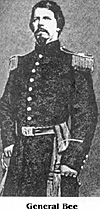
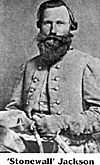 We have a similar, deeply cherished incident in our
own American history, and that is the story of how General
Thomas Jonathan Jackson (at right) came to be called "Stonewall." It
happened at First Bull Run (or "First Manassas" if you prefer
that version) all right, but the circumstances were a bit
different from the traditional explanation. Most of you are
familiar with that story, too: Supposedly, Confederate
General Bee (at left), driven back in disorder by the initial Union
attack, steadied his men by pointing to Jackson's command,
drawn up on the hill behind them, and shouting, "There
stands Jackson like a stone wall! Rally on the Virginians!" It
made a really striking phrase, and was in the Richmond
papers three days later.
We have a similar, deeply cherished incident in our
own American history, and that is the story of how General
Thomas Jonathan Jackson (at right) came to be called "Stonewall." It
happened at First Bull Run (or "First Manassas" if you prefer
that version) all right, but the circumstances were a bit
different from the traditional explanation. Most of you are
familiar with that story, too: Supposedly, Confederate
General Bee (at left), driven back in disorder by the initial Union
attack, steadied his men by pointing to Jackson's command,
drawn up on the hill behind them, and shouting, "There
stands Jackson like a stone wall! Rally on the Virginians!" It
made a really striking phrase, and was in the Richmond
papers three days later.
Let's pause a moment and analyse this legend. Bee commanded men from Alabama, Mississippi, and North Carolina. None of them, at that time, would have known Jackson from Adam's off-ox. If one of them, by some odd chance, had talked with Jackson's men before that battle, the Virginians undoubtedly would have told him that "Old Blue Light" Jackson was nutty enough for two fruit cakes certainly nobody to "rally on" in a tight place! As for the Virginians themselves, Bee's men would have considered them a dubious bunch of "up North furriners."
But could Bee have said something like that? Put yourself into his boots and stirrups for a minute. You're trying to hold your green troops together; they're getting slammed around badly, and most of them want to go elsewhere - preferably home. Several thousand muskets are going off all around you, as fast as men can load and pull trigger. Several batteries are slamming out canister; the air is full of smoke and howling buck-and-ball.
To keep them fighting, do you proclaim "There stands Jackson" - and rest of it??
Add the fact that Bee is an "Old Army" man - an American version of Cambronne - who spoke "Profane" with wondrous fluency.
What he apparently did say, to another officer, was something on the order of "Go tell that (asterisked) Jackson to quit standing there like a (qualified) stone wall and get his (censored) down here and lend a (blessed) hand!"
Unfortunately Bee was mortally wounded, so his version of the affair didn't get very wide circulation. Instead the original war correspondent's invention was further elaborated by another "ornament of the Southern press" into, "There is Jackson, standing like a stone wall. Let us determine to die here and we will conquer."
Waterloo Myth II
But to go back to Waterloo for another myth - one which is so funny - the story of the "ravine" (or the "sunken road") of Ohain.
This story tells how Napoleon launched his heavy cavalry in a massed charge at Wellington's centre, across unreconoitered terrain - only to see them tumble into an unsuspected ravine, crushing one another to death, and thus ruining his hope of a quick victory. There are at least two big paintings, showing these unfortunate French cuirassiers plunging into something that looks like a miniature Grand Canyon.
Well, this whole story is false. There was no such ravine on the battlefield; no French cavalry suffered any such fate. The whole business was invented by Victor Hugo, the famous French novelist, in his work, 'Les Miserables'. But, at least once a year, this fable reappears in some military periodicals, as a "historical" example of something or other. In fact, I recently was given a new English-language guide to the Waterloo battlefield with another picture of this piece of fiction.
Fiction of Limited War
Those three myths range from the harmless to the merely irritating. But there is another myth which has been tremendously influential: it crops up every time people begin to talk about "limited" war. This piece of fiction maintains that warfare during the 18th century was a really genteel affair, waged by gentlemen, who treated one another with distinguished courtesy and made every effort to spare the civilian population any avoidable discomfort. (The general implication seems to be that if we were gentlemen, we would figure out some way of doing likewise.) And every time this comes up, someone mentions the "Salute at Fontenoy."
This is a wonderful story -- the advancing British come up against the line of the crack French Guards. A British officer steps forward, raises his laced hat and calls out, "Gentlemen of the French Guards, fire first." And the French officers, not to be outdone in courtesies, raise their fancy hats and reply, "We never fire first, gentlemen."
It's all so genteel that it hurts. A few cynical individuals have suggested that it was all a dirty British trick, to get the French Guards to throw away their first volley so that the British could catch them reloading. This, however, wasn't so. The British had met the French Guard before. They knew that it had been stationed in Paris too long; that as fighters, its men were a lot of experienced lovers. Fire first, or fire last, those redcoats were perfectly convinced of their ability to smear the French Guard all over the landscape.
What did happen? Well, a British officer - the "eccentric" Lord Charles Hay - did step forward, but the item he was waving was his pocket flask (which he may have been putting to considerable use) and what he said, approximately, was "This time, you bastards, stand your ground and give a fight!"
Naturally, the French officers didn't understand him, especially with the English soldiers cheering the challenge. During the confused shouting, the French Guard's nerve broke and it popped off a scattered volley; the British let go a deadly reply, and what was left of the French Guard pulled foot and went away from there.
Obviously, Fontenoy wasn't as perfect an example of gentility as some people have thought. But this is only one example of myth making about the supposedly "limited" warfare of the eighteenth century. It was a very rough period, and any civilian unlucky enough to be in the combat zone had a lot more that his sensibilities ruffled. Of course, Frederick the Great kept his Prussian Army under very tight discipline: when his soldiers took a bath, they were marched to the appointed spot in ranks, under the supervision of an officer. If it hadn't been done that way, half of them would have deserted. Their pay was next to nothing, discipline was harsh, and chances of promotion non-existent.
Nevertheless, Frederick pretty well peeled the countryside whenever he marched. And some of the other armies weren't even that well-behaved. The French, for example, were described by one of their own generals as being "a band of robbers, of assassins, who deserve to be broken on the wheel; they turn tail at the first shot, and are always ready to mutiny."
More than that, these regular armies were supplemented by hordes of irregular troops, called variously Croats, Pandours, partisans, Grassins, Cossacks, Free Corps, and a dozen other outlandish names. Many of them were wild men from the southeastern frontiers of Europe. They spread over the countryside like a plague, foraging, looting, plundering, and playing highwayman between missions. These gentlemen usually received no pay: instead, they had "plunder rights", which means that they were entitled to keep whatever they could grab.
Naturally, they grabbed enthusiastically, especially from civilians. When they got through with a district, there wasn't an egg, an unbroken bottle, or a virgin left.
Such troops were an essential part of eighteenth century warfare, though few historians have given them much attention. If you read contemporary accounts, however, you soon learn that they could be a major factor in some campaigns. I very much doubt if we would care for their version of "limited war."
Practical Matters
Now, we might get down to practical matters for a few minutes. How should we go about working up a historical study or checking the historical accuracy of a book, program, or movie? A good many of you will have had experience enough to know that each project is something of a unique problem. However, I will offer the following rules of thumb:
 First, do not launch yourself into a project determined
to prove something. Instead, concentrate on learning. You
may soon find that your original idea was not as valid as you
thought it was. For example, at West Point we had a little
pamphlet on three military philosophers Jomini, Clausewitz
and Schlieffen. Jomini (at right) was presented as the one great,
overlooked genius of the Napoleonic wars, with the
implication that, if Jomini had not been driven from
Napoleon's side by the envy of lesser men, he might well
have saved Napoleon's empire. It was a touching story.
First, do not launch yourself into a project determined
to prove something. Instead, concentrate on learning. You
may soon find that your original idea was not as valid as you
thought it was. For example, at West Point we had a little
pamphlet on three military philosophers Jomini, Clausewitz
and Schlieffen. Jomini (at right) was presented as the one great,
overlooked genius of the Napoleonic wars, with the
implication that, if Jomini had not been driven from
Napoleon's side by the envy of lesser men, he might well
have saved Napoleon's empire. It was a touching story.
The only trouble was that every time I checked into one of the battles or campaigns where Jomini claimed to have saved the day, none of the afteraction reports or memoirs mentioned Jomini. If he had been there, he apparently had been away back in the rear rank. Becoming curious, I thrashed around through several stacks of reference material, finally discovering that this was another case where the author had "read a book." In this case, he wasn't entirely to blame, since there was just one book on Jomini available in the United States at that time.
This book had been written from stories told the author by Jomini when the latter was a very old man. Well, all of our own war stories have a tendency to improve with age, and Jomini had an even gaudier imagination than most of us here today. In short, he lied like SIX troopers. But the essential point here is that the author set out to prove that Jomini was an important military figure: he took the one readily available source (which agreed with this preconceived opinion), and he did not bother to check on what Jomini's contemporaries had to say.
Next, whenever possible, use original material. This becomes increasingly difficult as you go further back in history, but there still is an amazing amount of it squirreled away in our various libraries, and literally tons of it in the various European archives. If you are just looking for random historical examples of something or other, you can concentrate on those periods where this material is readily available.
One useful period is the American Civil War - The Official Records of the War of the Rebellion are about the richest collection of original material directly available to us. You may have some trouble reconciling the reports of the two opposing generals, but by the time you have worked your way down through the reports of a lot of frequently disgruntled lieutenants who came out of the action as acting regimental commanders, you will have a shrewd idea of what really happened.
In using the older original material, take a few precautions. Get a map of that same period as close as possible to the date you're studying. Modern maps may trip you up - forests have been cut down, swamps drained, new highways built, rivers canalized. Many a former battlefield now lies under a modern subdivision. (The battling may continue there, but it's now of interest to the sociologist and divorce lawyers, not the military historian.) The geographical features which governed a past campaign may have changed entirely.
For example, consider how the opening of the Suez and Panama canals altered all concepts of naval strategy almost overnight. And Carter's give-away of the Panama Canal may have done that all over again!
We won't discuss Suez.
Also, remember that languages change from generation to generation. How would you like to review your efficiency report and find that your commanding officer had described you as "nervous?" Today, that would be just about disastrous - but a little over a century ago, it would have been a compliment, meaning you were alert and spirited. Two centuries ago "stout" and "pretty" also were terms of praise for military men. These changes are especially tricky in foreign languages. You will find some modern books - including one published under the sponsorship of the Canadian Army - which describing Napoleon's troops as being armed with "rifles". The reason for this blooper is simple.
The author (who, by the way, is a better-than-average writer) merely used a modern French - English dictionary. The French have always used the word "fusil" to designate an infantryman's shooting iron, whatever it might be. In Napoleon's time it was a smooth bore, muzzleloading, single- shot weapon: today, it's a semiautomatic rifle. Just about everything about it has changed, except its name. Consequently, it's a good idea to get a hold of a contemporary military dictionary. This isn't always easy, but I have seen examples published as early as 1783, and many of the earlier books on soldiering will be loaded with definitions.
Finally, as the above examples probably have suggested to you, it is a very risky thing to make hasty decisions on former battles and campaigns unless you have achieved a thorough understanding of the armies of that period and of the terrain over which they fought. This takes time. It will involve a lot of selective reading and - if possible travelling on your own. But it is worth it.
As aids to getting this understanding, you can use a great variety of material - personal memoirs, infantry drill regulations, unit histories, public records, sailing directions, and the publications of the many various historical groups. Don't forget encyclopedias and almanacs. Memoirs and regimental histories are extremely useful, though occasionally treacherous. Some of the authors had just one thing on their minds, besides food. They are very vague about where they marched and how they fought, but their personal comforts and discomforts are recorded at great length. Other authors - like the famous Baron Marcellin Marbot, who left a fascinating book on his adventures as a cavalry officer under Napoleon - would have you believe that they, personally, won just about every battle in the book. Even so, you can't ignore them: men like Marbot may "gild the lily" somewhat, but they also were good soldiers. Little by little, and year by year, we chip away at the historical myths.
For a juicy one, let us return to little Jomini. In 1806, as a staff-officer with Marshal Ney's VI Corps, he had drawn up a study predicting the strategy Napoleon would employ in the anticipated war with Prussia - something not too difficult for someone who knew the positions of the French forces and had a good map of northern Germany.
He was summoned to Napoleon's headquarters at Mainz, where the Emperor informed him that because of his earlier writings on the campaigns of Frederick the Great - he would be attached to Imperial Headquarters for the forthcoming campaign.
Jomini requested permission to return to VI Corps to pick up his spare horses and equipment - saying that he would join the Emperor at Bamberg.
Bamberg was a choke point on Napoleon's projected advance northward through the Thuringian Forest. As Jomini proudly remembered it, Napoleon became quite agitated at its mention especially as Jomini then rattled off a forecast of Napoleon's coming strategy. He warned Jomini to keep this a secret. "No one must know that I am going to Bamberg - not even Berthier!"
Now this story explains why Jomini would be a resounding failure as a corps chief of staff. He obviously didn't know how an army really functioned - and expected his readers to share his ignorance.
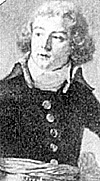 All right - what part of this story proves that it's
another example of Jomini's many self-glorifying
whackers? Right - don't tell Berthier (at right)!
All right - what part of this story proves that it's
another example of Jomini's many self-glorifying
whackers? Right - don't tell Berthier (at right)!
Apparently Jomini thought that some bright morning Napoleon was going to rise up, put on his hat, and announce "Mount up everybody! We're heading for Bamberg!" And the whole Grand Armee would promptly rise up and follow. What he never guessed, of course, was that Berthier and his staff had started working out the details of Napoleon's offensive about three weeks previously.
The good historical researcher, in fact, operates much like an expert intelligence officer. He uses every available source, he learns how much trust can be put in each of them, and he eventually develops a sort of sixth sense that tells him he has found either another myth or an overlooked historical lesson.
To close I know no better advice for fellow military historians than that given by General George H. Thomas to Thomas Van Horne when the latter prepared to write a history of "Pap" Thomas' Army of the Cumberland at the end of the Civil War.
"Write nothing but the truth. You will contravene received opinion (contradict popular accounts) and you must fortify yourself."
This article is based on a paper presented at this year's Napoleonic Fair, held in London and organised by Greenhill Books.
Back to Table of Contents -- Age of Napoleon #31
Back to Age of Napoleon List of Issues
Back to MagWeb Master Magazine List
© Copyright 1999 by Partizan Press.
This article appears in MagWeb (Magazine Web) on the Internet World Wide Web. Other military history articles and gaming articles are available at http://www.magweb.com